Abstract
OBJECTIVES: To assess the current results and outcome of surgery in infants and children with right atrial isomerism and complex congenital heart disease. SETTING: Tertiary referral centre. METHODS: 20 consecutive children with right atrial isomerism and complex congenital heart disease underwent surgery over a 6 year period between August 1987 and July 1993. The results and outcome were analysed according to age, presentation, and surgical procedures. RESULTS: Patients were divided into two groups depending on age at presentation and initial surgery: group A comprised 11 patients who required surgical intervention in the first month of life (mean age 5 days); and group B comprised nine patients who required initial surgical intervention after the first month of life (mean age 6.8 months). Seven (64%) of the 11 patients in group A had obstructed pulmonary venous drainage and ten (91%) had pulmonary atresia. There were seven early deaths (64%), including the five patients who required systemic to pulmonary artery shunt and simultaneous repair of obstructed pulmonary veins. The long-term survival rate in this group was 18% (two of 11). Pulmonary venous obstruction was present in two (22%) of the nine patients in group B and four (44%) had pulmonary atresia. There were no early deaths. One patient died after a second palliative procedure. There was one late sudden death. Four patients had a Fontan operation with no deaths. Two of the remaining three patients meet the Fontan criteria. The long-term survival rate in this group was 78% (seven of nine). CONCLUSIONS: Surgical management of patients with right atrial isomerism who have complex congenital heart disease carries a high mortality and remains palliative. The overall survival rate was 45% (nine of 20); 18% in patients requiring surgery in the first month of life (group A) and 78% in patients requiring surgery after the first month of life (group B) (P < 0.001). Of the total of 20 patients, nine were potential candidates for a Fontan operation. Seven of these have undergone a Fontan procedure with five survivors.
Full text
PDF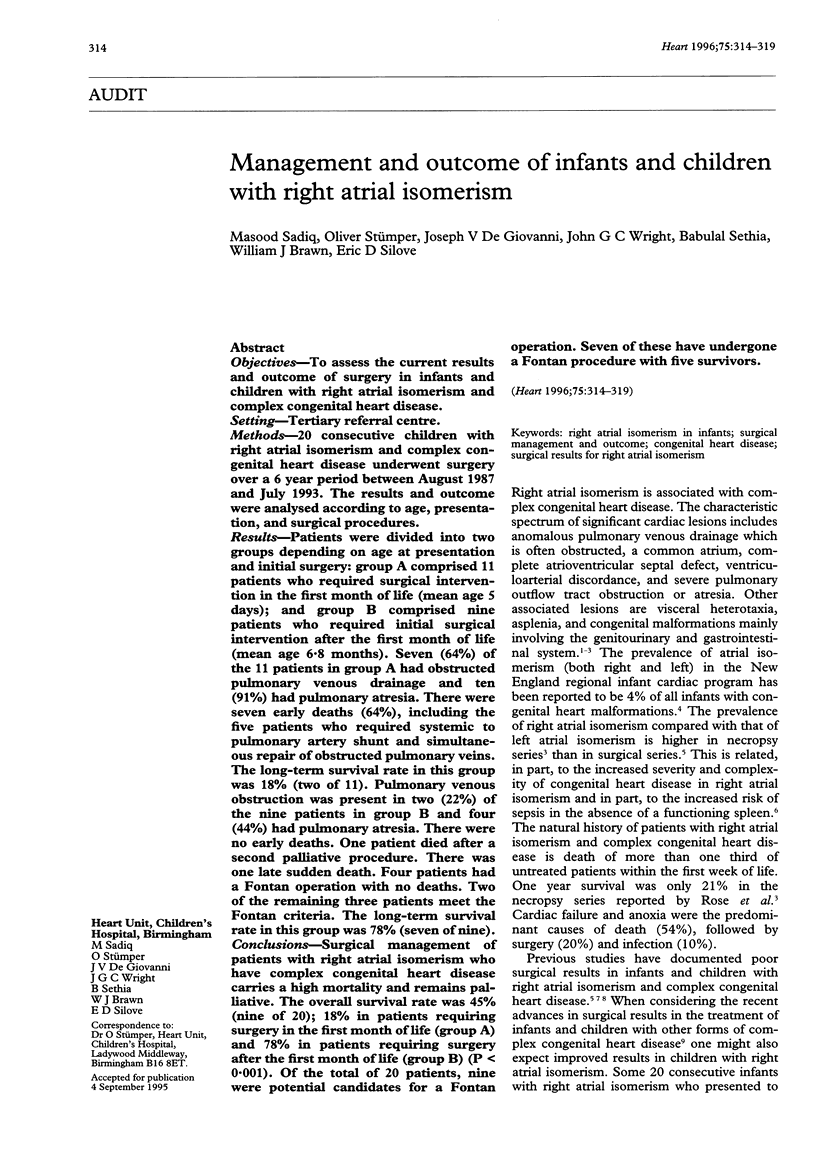
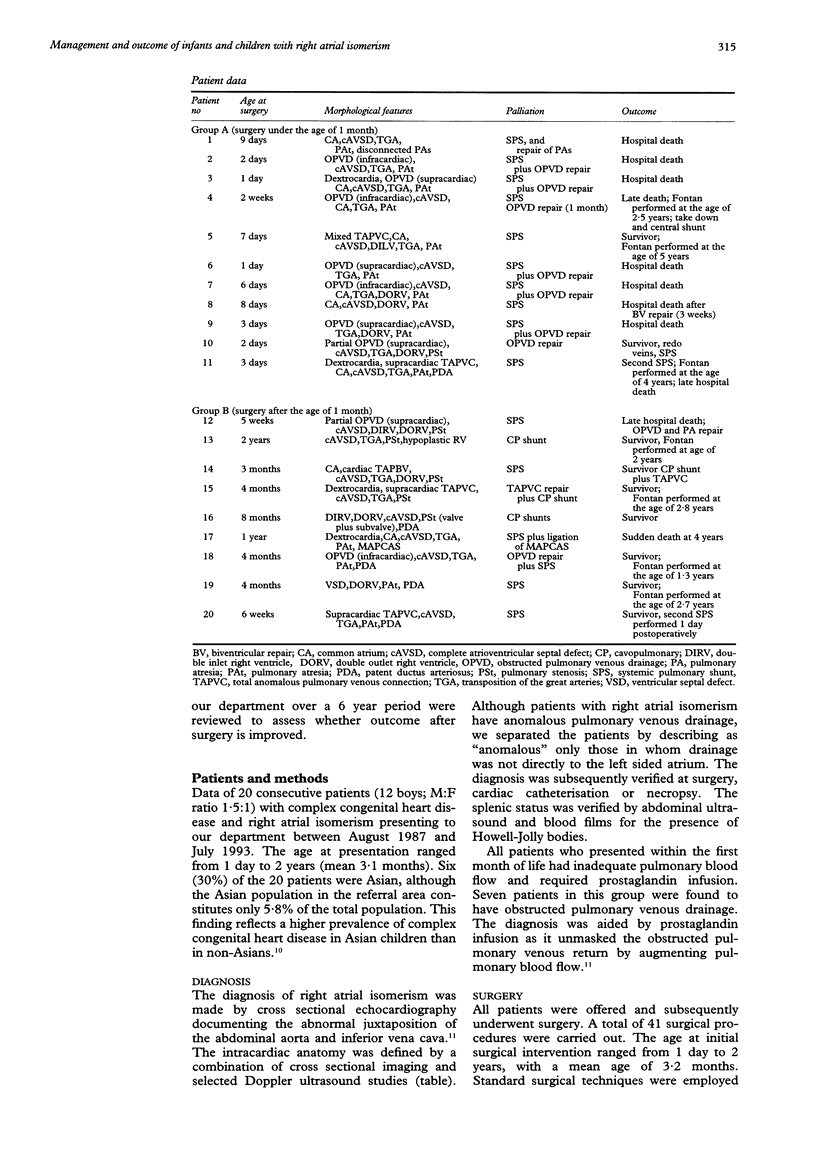
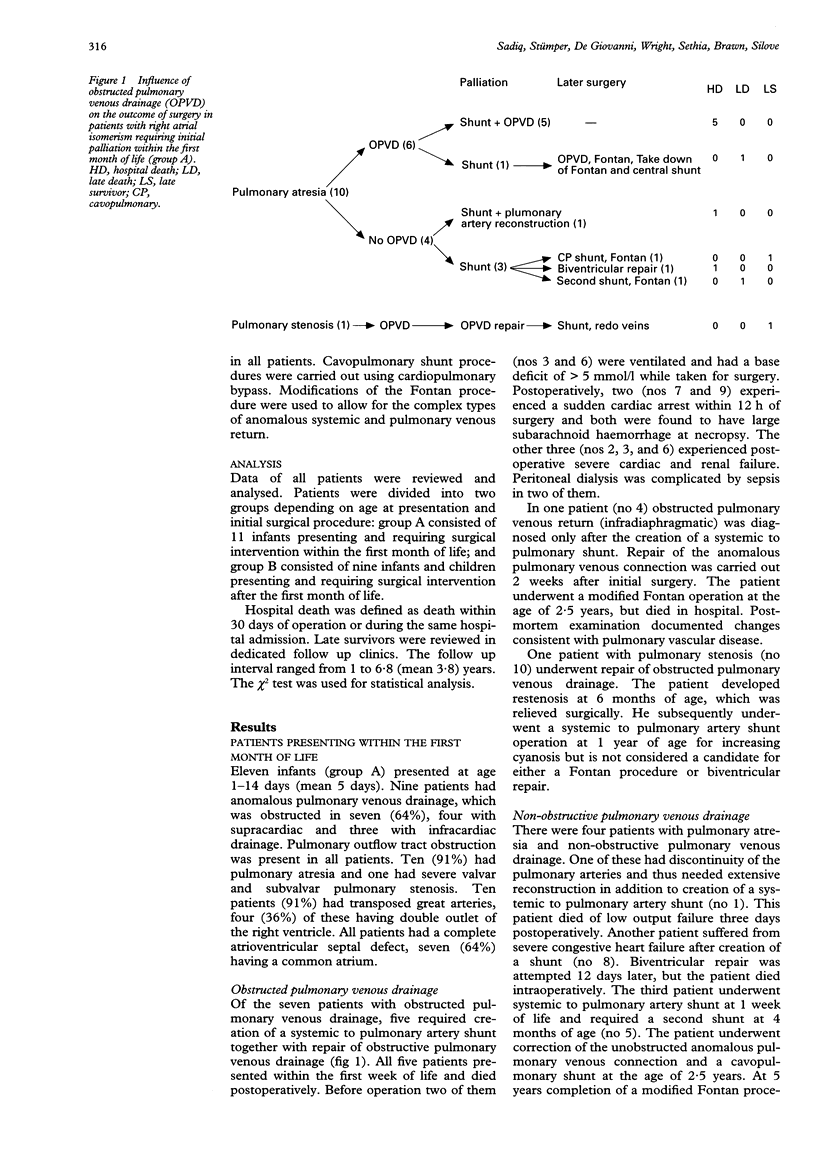
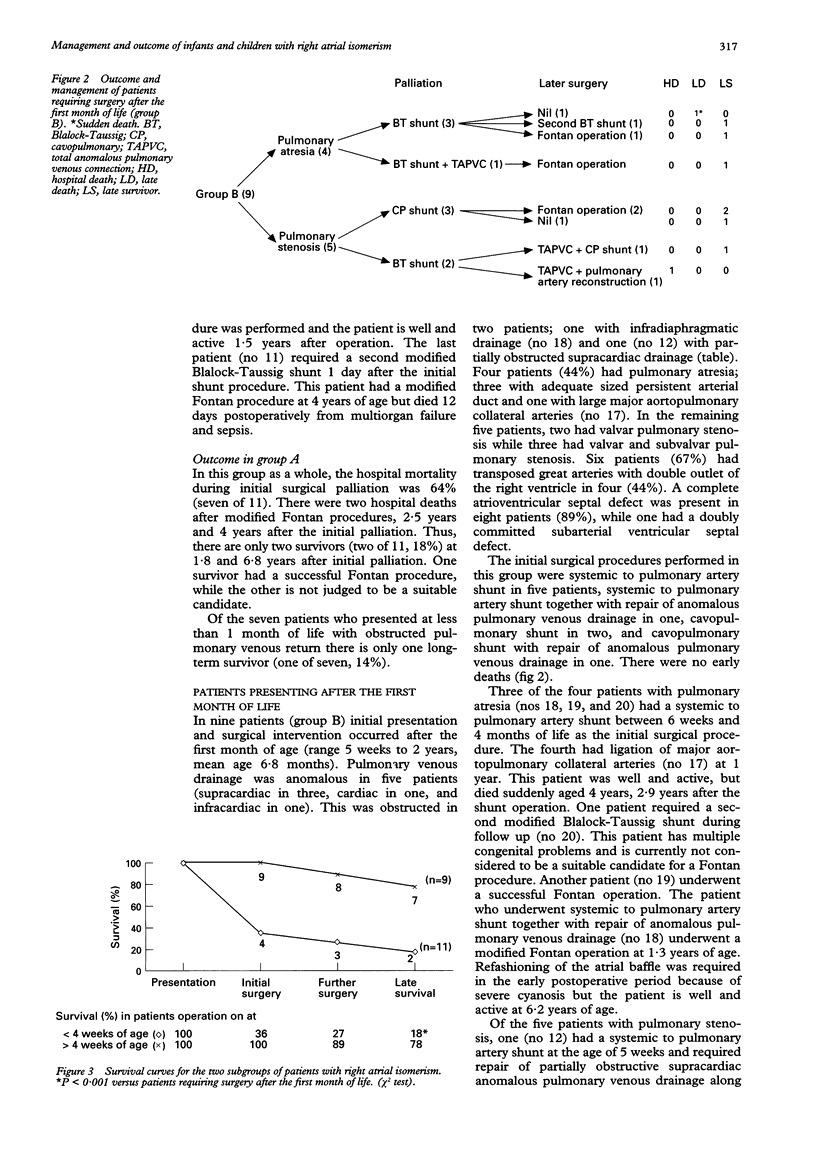
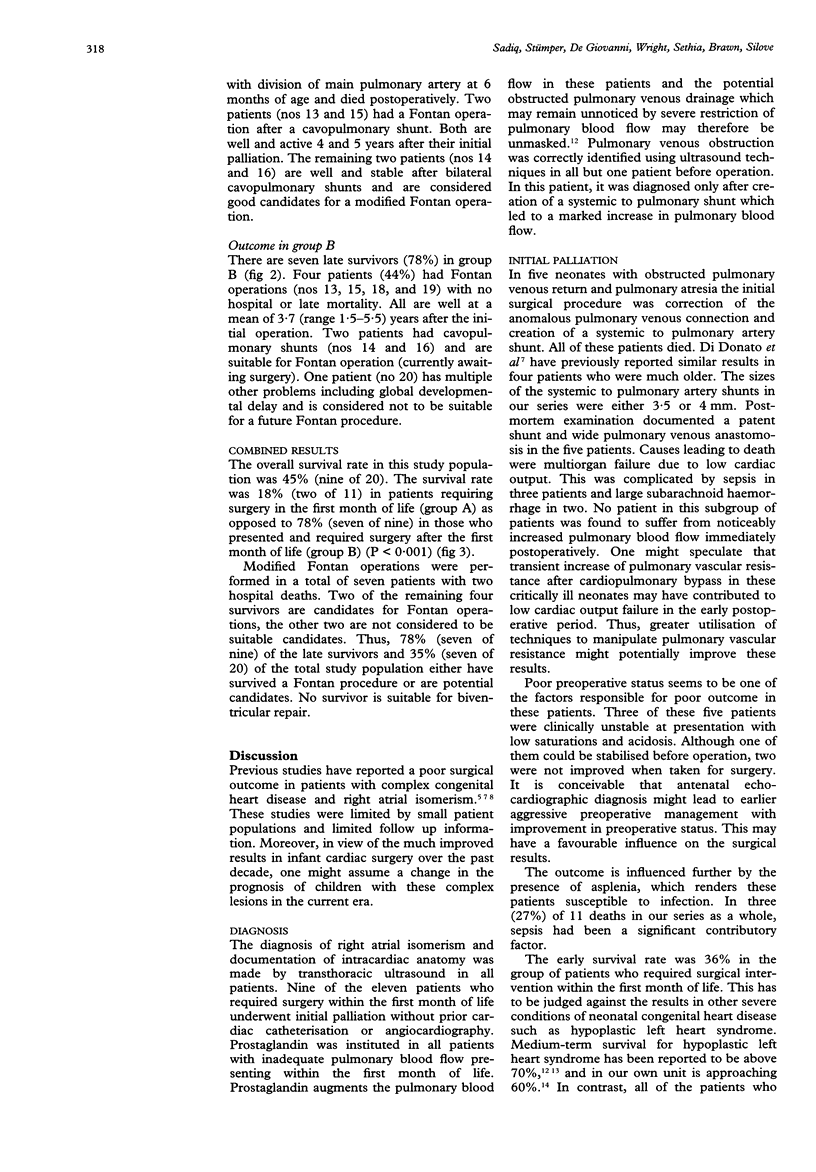
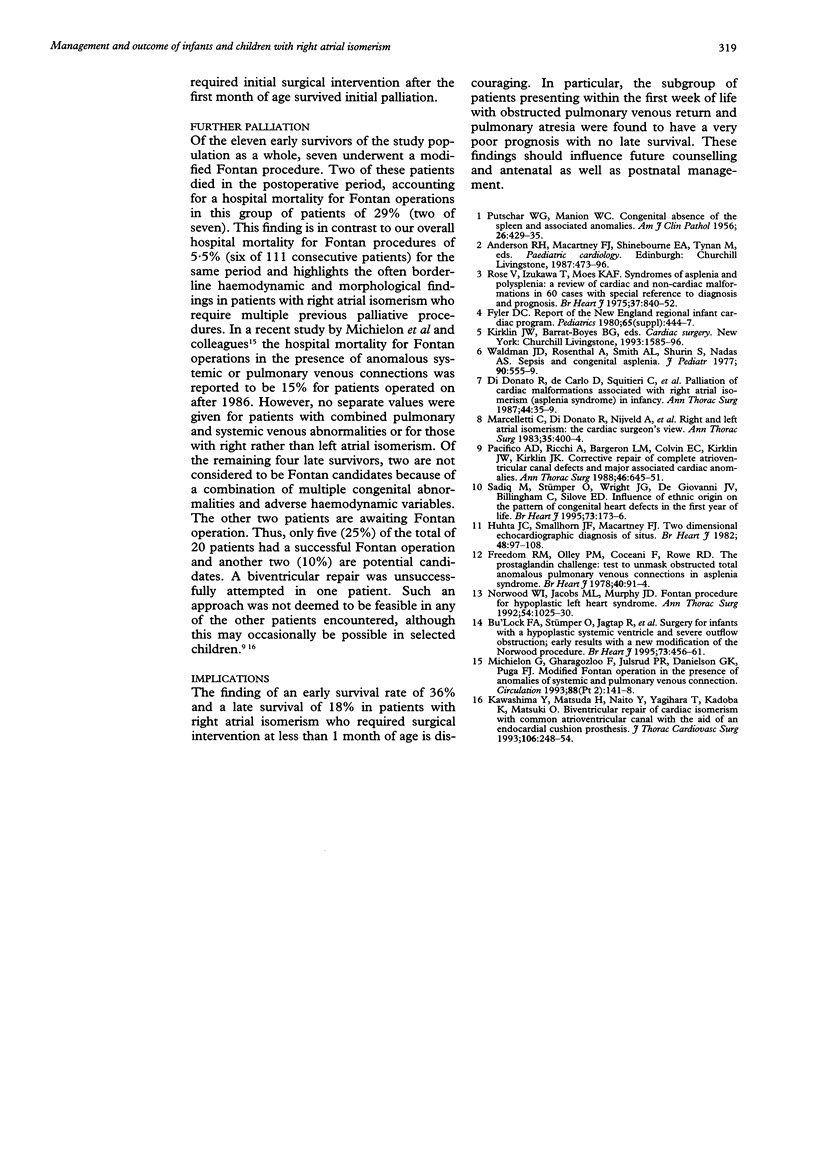
Selected References
These references are in PubMed. This may not be the complete list of references from this article.
- Bu'Lock F. A., Stümper O., Jagtap R., Silove E. D., De Giovanni J. V., Wright J. G., Sethia B., Brawn W. J. Surgery for infants with a hypoplastic systemic ventricle and severe outflow obstruction: early results with a modified Norwood procedure. Br Heart J. 1995 May;73(5):456–461. doi: 10.1136/hrt.73.5.456. [DOI] [PMC free article] [PubMed] [Google Scholar]
- Di Donato R., di Carlo D., Squitieri C., Rossi E., Ammirati A., Marino B., Marcelletti C. Palliation of cardiac malformations associated with right isomerism (asplenia syndrome) in infancy. Ann Thorac Surg. 1987 Jul;44(1):35–39. doi: 10.1016/s0003-4975(10)62353-3. [DOI] [PubMed] [Google Scholar]
- Freedom R. M., Olley P. M., Coceani F., Rowe R. D. The prostaglandin challenge. Test to unmask obstructed total anomalous pulmonary venous connections in asplenia syndrome. Br Heart J. 1978 Jan;40(1):91–94. doi: 10.1136/hrt.40.1.91. [DOI] [PMC free article] [PubMed] [Google Scholar]
- Huhta J. C., Smallhorn J. F., Macartney F. J. Two dimensional echocardiographic diagnosis of situs. Br Heart J. 1982 Aug;48(2):97–108. doi: 10.1136/hrt.48.2.97. [DOI] [PMC free article] [PubMed] [Google Scholar]
- Kawashima Y., Matsuda H., Naito Y., Yagihara T., Kadoba K., Matsuki O. Biventricular repair of cardiac isomerism with common atrioventricular canal with the aid of an endocardial cushion prosthesis. J Thorac Cardiovasc Surg. 1993 Aug;106(2):248–254. [PubMed] [Google Scholar]
- Marcelletti C., Di Donato R., Nijveld A., Squitieri C., Bulterijs A. H., Naeff M., Schuller J., Becker A. E. Right and left isomerism: the cardiac surgeon's view. Ann Thorac Surg. 1983 Apr;35(4):400–405. doi: 10.1016/s0003-4975(10)61592-5. [DOI] [PubMed] [Google Scholar]
- Norwood W. I., Jr, Jacobs M. L., Murphy J. D. Fontan procedure for hypoplastic left heart syndrome. Ann Thorac Surg. 1992 Dec;54(6):1025–1030. doi: 10.1016/0003-4975(92)90065-c. [DOI] [PubMed] [Google Scholar]
- PUTSCHAR W. G., MANION W. C. Congenital absence of the spleen and associated anomalies. Am J Clin Pathol. 1956 May;26(5):429–470. doi: 10.1093/ajcp/26.5.429. [DOI] [PubMed] [Google Scholar]
- Pacifico A. D., Ricchi A., Bargeron L. M., Jr, Colvin E. C., Kirklin J. W., Kirklin J. K. Corrective repair of complete atrioventricular canal defects and major associated cardiac anomalies. Ann Thorac Surg. 1988 Dec;46(6):645–651. doi: 10.1016/s0003-4975(10)64726-1. [DOI] [PubMed] [Google Scholar]
- Rose V., Izukawa T., Moës C. A. Syndromes of asplenia and polysplenia. A review of cardiac and non-cardiac malformations in 60 cases withspecial reference to diagnosis and prognosis. Br Heart J. 1975 Aug;37(8):840–852. doi: 10.1136/hrt.37.8.840. [DOI] [PMC free article] [PubMed] [Google Scholar]
- Sadiq M., Stümper O., Wright J. G., De Giovanni J. V., Billingham C., Silove E. D. Influence of ethnic origin on the pattern of congenital heart defects in the first year of life. Br Heart J. 1995 Feb;73(2):173–176. doi: 10.1136/hrt.73.2.173. [DOI] [PMC free article] [PubMed] [Google Scholar]
- Waldman J. D., Rosenthal A., Smith A. L., Shurin S., Nadas A. S. Sepsis and congenital asplenia. J Pediatr. 1977 Apr;90(4):555–559. doi: 10.1016/s0022-3476(77)80365-x. [DOI] [PubMed] [Google Scholar]


